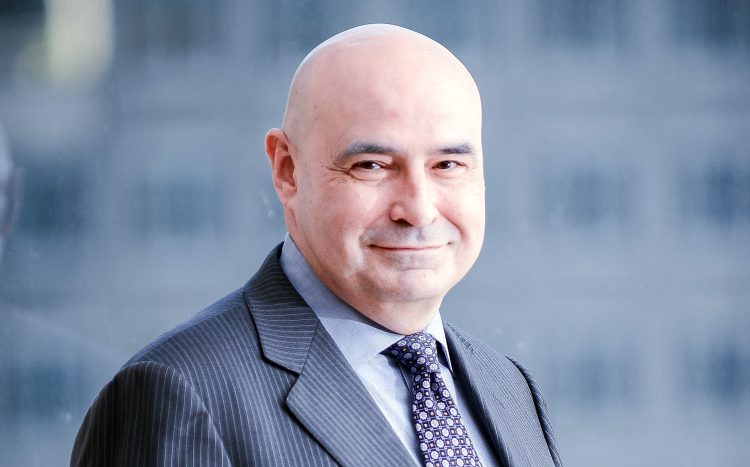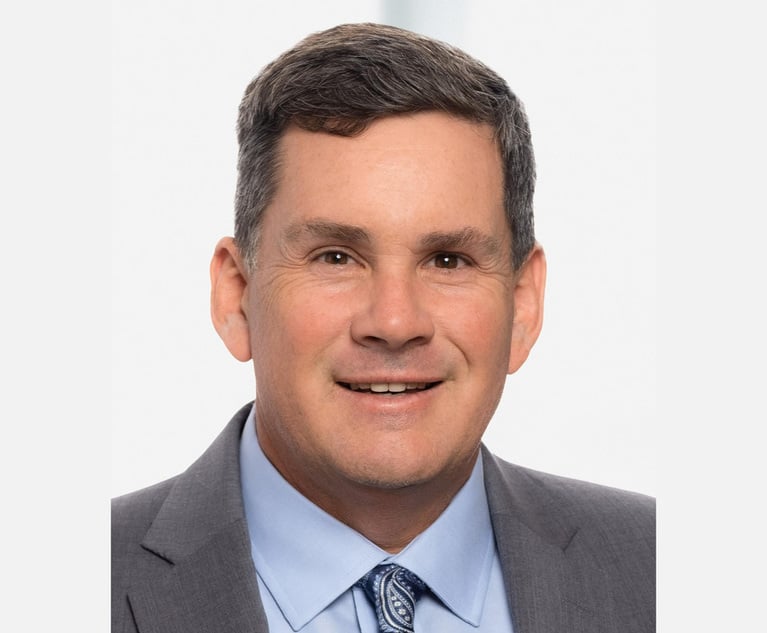First Openly Gay President of Major NY Bar Association Talks About Diversity
In the not-too-distant past, I would have been marginalized for being a gay man but now I am the first openly gay president of a major bar association in New York.
June 03, 2019 at 11:05 AM
7 minute read
 Stephen Lessard of Orrick, Herrington & Sutcliffe. Photo by David Handschuh/New York Law Journal
Stephen Lessard of Orrick, Herrington & Sutcliffe. Photo by David Handschuh/New York Law Journal
Stephen Lessard, a senior associate in the New York office of Orrick, Herrington & Sutcliffe and a member of the firm's tax group, is the new president of the New York County Lawyers Association. Before joining the firm, he was a surface warfare officer in the U.S. Navy.
He describes himself as the first openly gay president of a major bar association in New York. In this Q&A with the New York Law Journal, he speaks about the association's principles of diversity and inclusion, saying he is a beneficiary of those policies.
Q: Why did you decide to seek the presidency of the New York County Lawyers Association? What in your experience has prepared you for this position?
A: I decided to seek the presidency of NYCLA because I genuinely believe in all that this association represents. NYCLA was founded upon the principles of diversity and inclusion, and it has adhered to these core values throughout its history. I am a beneficiary of NYCLA's commitment to these principles. In the not-too-distant past, I would have been marginalized for being a gay man but now I am the first openly gay president of a major bar association in New York. For that, I am indebted to the leadership NYCLA has demonstrated on issues of equality under the law. NYCLA has been rightly called “the Bar Association of Opportunity.”
Prior to attending law school, I served in the U.S. Navy for 20 years. I view bar service and bar leadership as a natural progression of my military service—public service as a professional obligation. When I was commissioned as a naval officer, I swore an oath to support and defend the Constitution of the United States—to support and defend the American rule of law. When we became members of the bar, we took a similar oath. Each of us has a professional obligation to answer the call to serve the public and to protect the rule of law. The most effective way for us to do that is through a bar association, where our individual voices can join into a clarion call.
Q: With law firms cutting expenses, how will you demonstrate that membership in the New York County Lawyers Association is essential? How will you get members who are not active to take advantage of their membership?
A: The public gives lawyers the privilege to practice law and, in return, all lawyers have a professional obligation to serve the public. I think this obligation is best fulfilled through a bar association such as NYCLA. Members of the legal profession can collaborate on improving the law, educating the public, and promoting access to justice through committee involvement, public forums, networking, pro bono programs and CLE at NYCLA. This collaboration is beneficial to the public; aggregating many perspectives better reflects the diversity of the community and hopefully leads to justice for everyone. It is also beneficial to individual members, offering diverse interactions with other attorneys from varied practice settings and experiences. Additionally, NYCLA is unique among bar association in the opportunities that we provide to lawyers who are in the early stages of their professional careers. These lawyers are afforded opportunities to participate in committees, event and CLE planning, and leadership of the association that are not typically offered in other bar associations. Those opportunities can be extremely beneficial to both the individual lawyers and their employers. For these reasons, I think you could view membership in NYCLA as essential.
Increasing engagement with our members is always an important priority for us. We think that our plan to leverage new technologies will make it easier for our members to connect with NYCLA and each other. The NYCLA value proposition is very strong, and our open and welcoming organization makes it easy for every member to engage immediately.
Q: What efforts will you make to increase membership, particularly among diverse lawyers, lawyers with unpopular political views and those employed by midsize and smaller firms?
A: Our members represent myriad political leanings and positions and NYCLA is a place where all views are accepted and respected. The majority of NYCLA's members are comprised of attorneys from midsize and small firms. We believe the plans for our new Home of Law will allow us to better serve the needs of these lawyers in their practices by providing flexible meeting space and technologically advanced legal resources.
Q: What is your plan for attracting lawyers in specialized fields?
A: NYCLA already offers our members opportunities to participate in a wide range of sections and committees that focus on specialized fields of law. In addition to attracting lawyers practicing in various areas of the law, I would like to see an increase in attorneys from diverse practice settings, particularly public sector and in-house attorneys. I think membership by these attorneys in bar associations such as NYCLA would be mutually beneficial. For these attorneys, involvement in a NYCLA committee provides them with the ability to influence the conversation with their unique perspectives, which is essential to improving the rule of law.
Our In-House/Outside Counsel Committee provides a forum in which in-house counsel can interact with law firm practitioners and share information and best practices on issues that impact corporate law departments. Our CLE offerings also speak to their needs, offering invaluable programs including the recent “Sexual Harassment: Workplace Investigations and Litigation in the #MeToo Era,” “Transgender Employee Rights,” and “Trademarks and Branding: What In-House Counsel Needs to Know.” NYCLA is well equipped to provide a unique and productive professional home for public sector and in-house attorneys.
Q: What will be your priorities as a bar association president? Name the ways in which you want to take the bar association in new directions.
A: We recently announced that we are seeking the attorney general's approval of the sale of our building and moving our headquarters to the newly transformed 28 Liberty St. My priority in the upcoming year will be to transition NYCLA from a 20th-century bar association to a 21st-century bar association. Our core mission of promoting justice for everyone has not changed. How we accomplish our mission will change. We will now be able to leverage technology and flexible space to better serve a new generation of lawyers. Through improved technological support for our committees and programs, and the provision of new virtual services, we will facilitate the work of our members.
During this transition, NYCLA will continue to fight for justice. NYCLA has pioneered some of the most far-reaching and tangible reforms to improve the rule of law, and our transition will not stop that. In 1997, NYCLA led the bar to increase fees for Article 18(b) attorneys in order to improve the quality of defense afforded to indigent defendants. Those rates have not changed in the last 15 years and I fear it has become increasingly difficult to recruit experienced attorneys to take on assigned counsel in order for the city and state to meet their constitutional obligations. A society is rightfully judged by how it treats its least privileged members. To this point, NYCLA is forming a task force to examine assigned counsel rates and whether they are sufficient. This is an issue that impacts equal treatment under the law and the public's faith in the rule of law. NYCLA took the lead on this issue two decades ago, and it will once again take the lead today.
Q: At the end of your term, how will you judge if it has been a success?
A: My hope is to leave NYCLA in an even better position than when I assumed the presidency. I think I will accomplish this if we have a smooth and easy move into our new home, provide better service to our members, and engage more members in our programs.
This content has been archived. It is available through our partners, LexisNexis® and Bloomberg Law.
To view this content, please continue to their sites.
Not a Lexis Subscriber?
Subscribe Now
Not a Bloomberg Law Subscriber?
Subscribe Now
NOT FOR REPRINT
© 2025 ALM Global, LLC, All Rights Reserved. Request academic re-use from www.copyright.com. All other uses, submit a request to [email protected]. For more information visit Asset & Logo Licensing.
You Might Like
View All
Labaton’s Eric Belfi on Running Case Investigation, Analysis and Delaware Presence

Litigation Leaders: Quinn Emanuel's Michael Carlinsky on Training Associates to Think and Act Like Trial Lawyers

Innovation Award Individual Finalist: Charlie Hernandez, My Pocket Lawyer
1 minute read
Trending Stories
Who Got The Work
J. Brugh Lower of Gibbons has entered an appearance for industrial equipment supplier Devco Corporation in a pending trademark infringement lawsuit. The suit, accusing the defendant of selling knock-off Graco products, was filed Dec. 18 in New Jersey District Court by Rivkin Radler on behalf of Graco Inc. and Graco Minnesota. The case, assigned to U.S. District Judge Zahid N. Quraishi, is 3:24-cv-11294, Graco Inc. et al v. Devco Corporation.
Who Got The Work
Rebecca Maller-Stein and Kent A. Yalowitz of Arnold & Porter Kaye Scholer have entered their appearances for Hanaco Venture Capital and its executives, Lior Prosor and David Frankel, in a pending securities lawsuit. The action, filed on Dec. 24 in New York Southern District Court by Zell, Aron & Co. on behalf of Goldeneye Advisors, accuses the defendants of negligently and fraudulently managing the plaintiff's $1 million investment. The case, assigned to U.S. District Judge Vernon S. Broderick, is 1:24-cv-09918, Goldeneye Advisors, LLC v. Hanaco Venture Capital, Ltd. et al.
Who Got The Work
Attorneys from A&O Shearman has stepped in as defense counsel for Toronto-Dominion Bank and other defendants in a pending securities class action. The suit, filed Dec. 11 in New York Southern District Court by Bleichmar Fonti & Auld, accuses the defendants of concealing the bank's 'pervasive' deficiencies in regards to its compliance with the Bank Secrecy Act and the quality of its anti-money laundering controls. The case, assigned to U.S. District Judge Arun Subramanian, is 1:24-cv-09445, Gonzalez v. The Toronto-Dominion Bank et al.
Who Got The Work
Crown Castle International, a Pennsylvania company providing shared communications infrastructure, has turned to Luke D. Wolf of Gordon Rees Scully Mansukhani to fend off a pending breach-of-contract lawsuit. The court action, filed Nov. 25 in Michigan Eastern District Court by Hooper Hathaway PC on behalf of The Town Residences LLC, accuses Crown Castle of failing to transfer approximately $30,000 in utility payments from T-Mobile in breach of a roof-top lease and assignment agreement. The case, assigned to U.S. District Judge Susan K. Declercq, is 2:24-cv-13131, The Town Residences LLC v. T-Mobile US, Inc. et al.
Who Got The Work
Wilfred P. Coronato and Daniel M. Schwartz of McCarter & English have stepped in as defense counsel to Electrolux Home Products Inc. in a pending product liability lawsuit. The court action, filed Nov. 26 in New York Eastern District Court by Poulos Lopiccolo PC and Nagel Rice LLP on behalf of David Stern, alleges that the defendant's refrigerators’ drawers and shelving repeatedly break and fall apart within months after purchase. The case, assigned to U.S. District Judge Joan M. Azrack, is 2:24-cv-08204, Stern v. Electrolux Home Products, Inc.
Featured Firms
Law Offices of Gary Martin Hays & Associates, P.C.
(470) 294-1674
Law Offices of Mark E. Salomone
(857) 444-6468
Smith & Hassler
(713) 739-1250






